Aishah Irfan: Mental Health and Wellbeing Report, Unit 2
VerifiedAdded on 2021/04/27
|12
|2987
|158
Report
AI Summary
This report, authored by Aishah Irfan, delves into the multifaceted aspects of mental health and wellbeing. It begins by emphasizing the significance of early childhood experiences and their lasting impact on individuals, including the potential for childhood trauma and its effects. The report then outlines early warning signs of mental stress, the benefits of early intervention in mental health, and the support structures provided by public service organizations. It further explores interventions for healthy coping mechanisms, strategies for building resilience, and the pros and cons of using social media to promote mental health. The report concludes with a focus on a local/national strategy promoting mental health and resilience for the police force, highlighting the importance of mental wellbeing across different sectors.
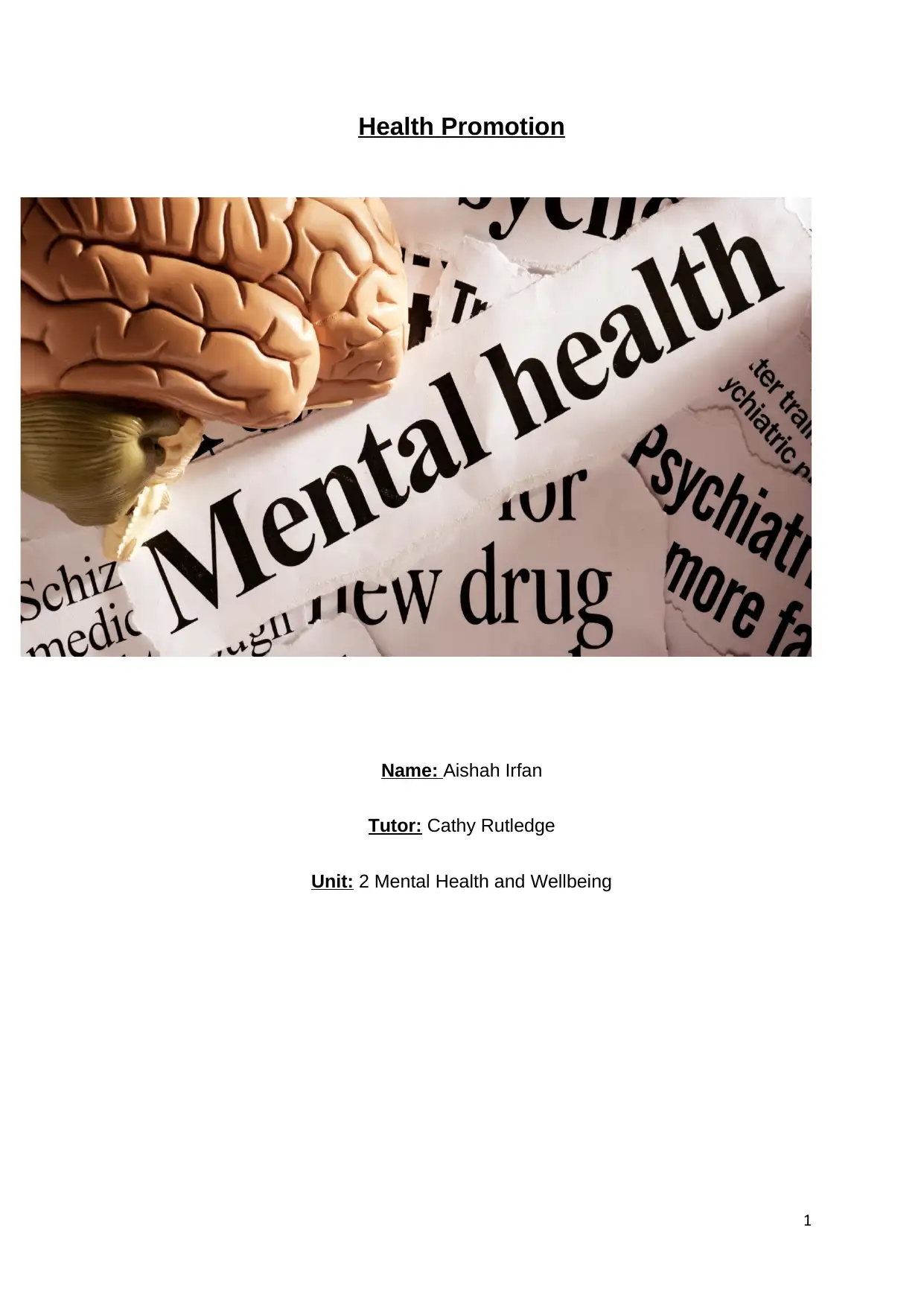
Health Promotion
Name: Aishah Irfan
Tutor: Cathy Rutledge
Unit: 2 Mental Health and Wellbeing
1
Name: Aishah Irfan
Tutor: Cathy Rutledge
Unit: 2 Mental Health and Wellbeing
1
Paraphrase This Document
Need a fresh take? Get an instant paraphrase of this document with our AI Paraphraser
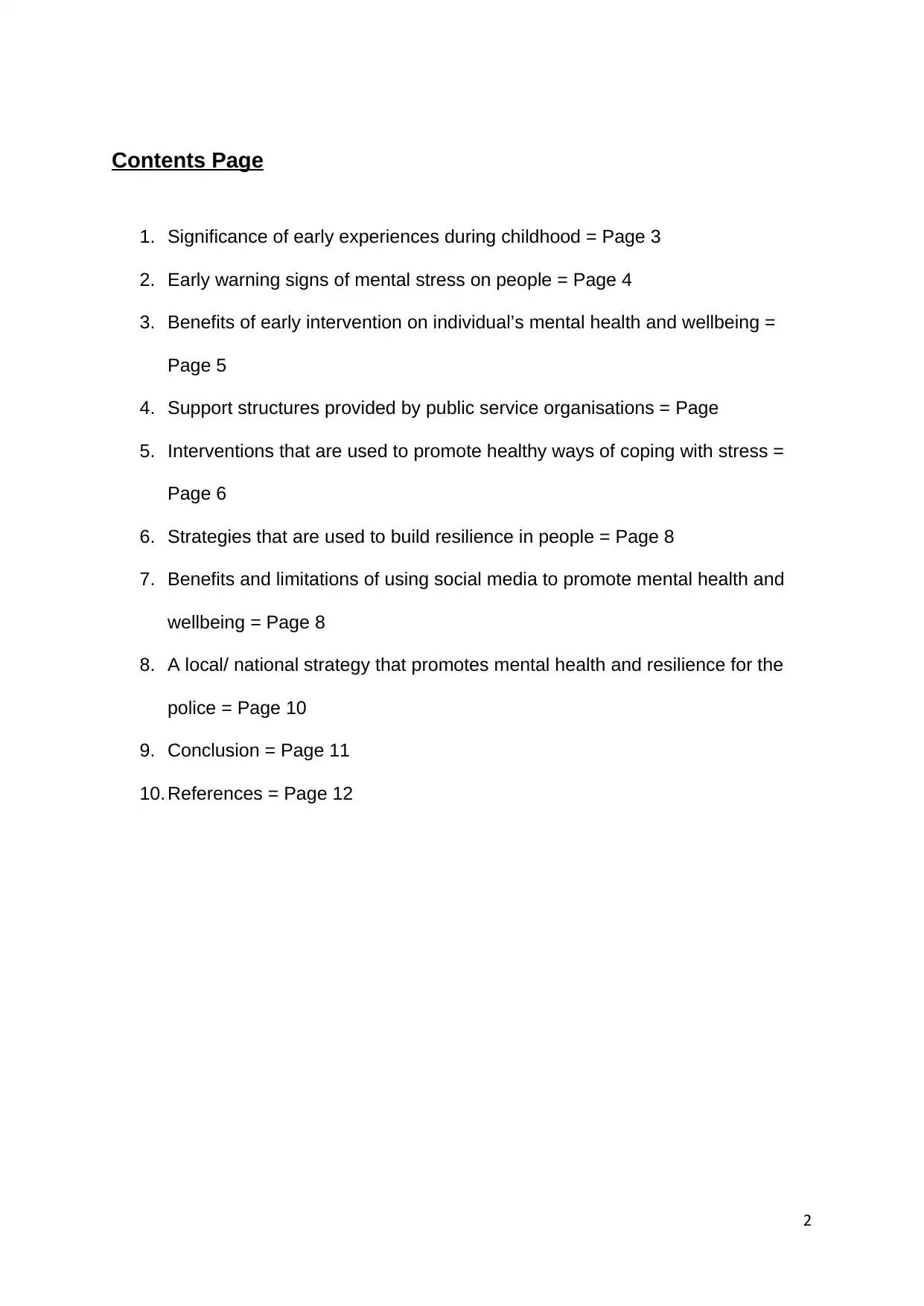
Contents Page
1. Significance of early experiences during childhood = Page 3
2. Early warning signs of mental stress on people = Page 4
3. Benefits of early intervention on individual’s mental health and wellbeing =
Page 5
4. Support structures provided by public service organisations = Page
5. Interventions that are used to promote healthy ways of coping with stress =
Page 6
6. Strategies that are used to build resilience in people = Page 8
7. Benefits and limitations of using social media to promote mental health and
wellbeing = Page 8
8. A local/ national strategy that promotes mental health and resilience for the
police = Page 10
9. Conclusion = Page 11
10. References = Page 12
2
1. Significance of early experiences during childhood = Page 3
2. Early warning signs of mental stress on people = Page 4
3. Benefits of early intervention on individual’s mental health and wellbeing =
Page 5
4. Support structures provided by public service organisations = Page
5. Interventions that are used to promote healthy ways of coping with stress =
Page 6
6. Strategies that are used to build resilience in people = Page 8
7. Benefits and limitations of using social media to promote mental health and
wellbeing = Page 8
8. A local/ national strategy that promotes mental health and resilience for the
police = Page 10
9. Conclusion = Page 11
10. References = Page 12
2
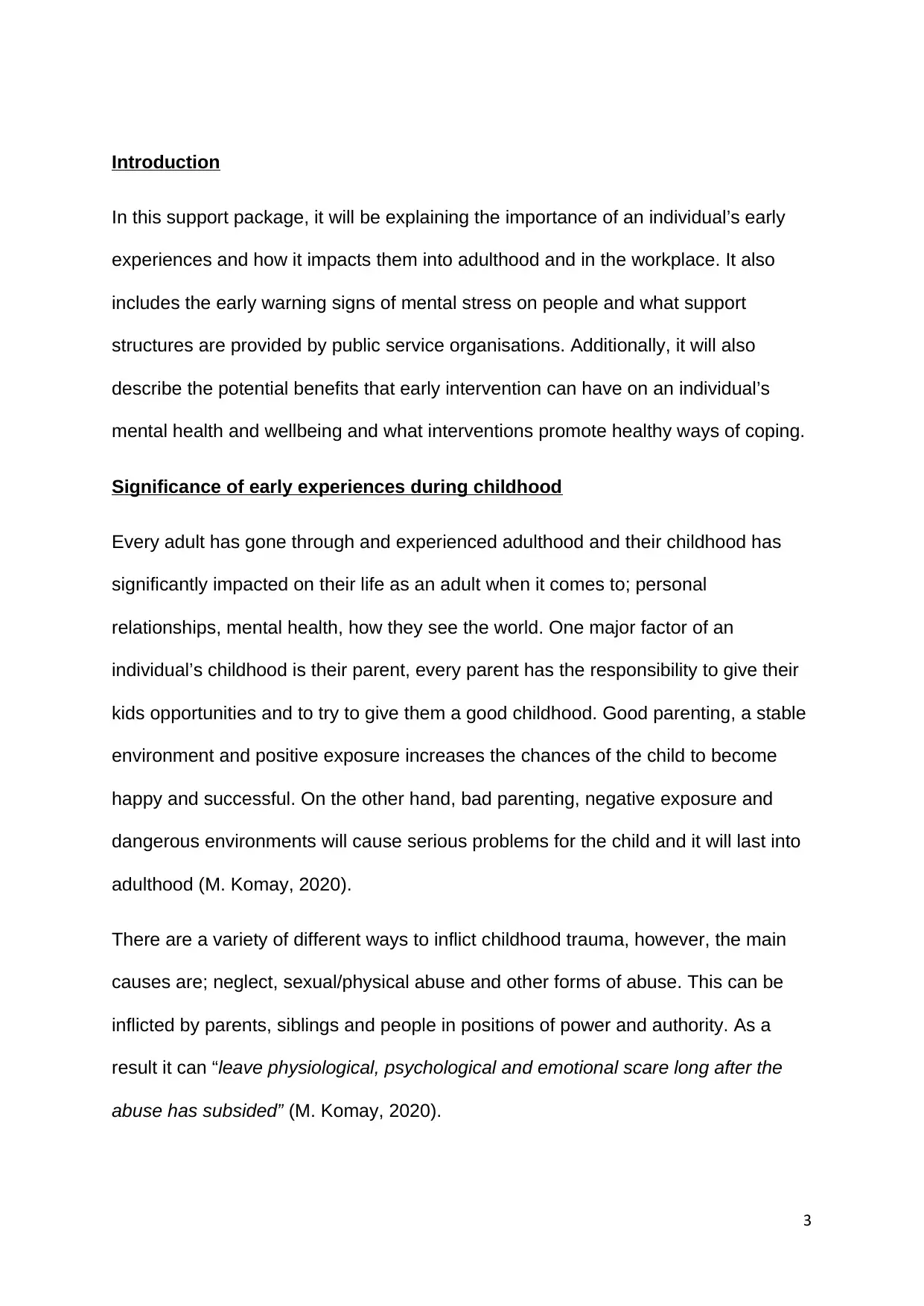
Introduction
In this support package, it will be explaining the importance of an individual’s early
experiences and how it impacts them into adulthood and in the workplace. It also
includes the early warning signs of mental stress on people and what support
structures are provided by public service organisations. Additionally, it will also
describe the potential benefits that early intervention can have on an individual’s
mental health and wellbeing and what interventions promote healthy ways of coping.
Significance of early experiences during childhood
Every adult has gone through and experienced adulthood and their childhood has
significantly impacted on their life as an adult when it comes to; personal
relationships, mental health, how they see the world. One major factor of an
individual’s childhood is their parent, every parent has the responsibility to give their
kids opportunities and to try to give them a good childhood. Good parenting, a stable
environment and positive exposure increases the chances of the child to become
happy and successful. On the other hand, bad parenting, negative exposure and
dangerous environments will cause serious problems for the child and it will last into
adulthood (M. Komay, 2020).
There are a variety of different ways to inflict childhood trauma, however, the main
causes are; neglect, sexual/physical abuse and other forms of abuse. This can be
inflicted by parents, siblings and people in positions of power and authority. As a
result it can “leave physiological, psychological and emotional scare long after the
abuse has subsided” (M. Komay, 2020).
3
In this support package, it will be explaining the importance of an individual’s early
experiences and how it impacts them into adulthood and in the workplace. It also
includes the early warning signs of mental stress on people and what support
structures are provided by public service organisations. Additionally, it will also
describe the potential benefits that early intervention can have on an individual’s
mental health and wellbeing and what interventions promote healthy ways of coping.
Significance of early experiences during childhood
Every adult has gone through and experienced adulthood and their childhood has
significantly impacted on their life as an adult when it comes to; personal
relationships, mental health, how they see the world. One major factor of an
individual’s childhood is their parent, every parent has the responsibility to give their
kids opportunities and to try to give them a good childhood. Good parenting, a stable
environment and positive exposure increases the chances of the child to become
happy and successful. On the other hand, bad parenting, negative exposure and
dangerous environments will cause serious problems for the child and it will last into
adulthood (M. Komay, 2020).
There are a variety of different ways to inflict childhood trauma, however, the main
causes are; neglect, sexual/physical abuse and other forms of abuse. This can be
inflicted by parents, siblings and people in positions of power and authority. As a
result it can “leave physiological, psychological and emotional scare long after the
abuse has subsided” (M. Komay, 2020).
3
⊘ This is a preview!⊘
Do you want full access?
Subscribe today to unlock all pages.

Trusted by 1+ million students worldwide
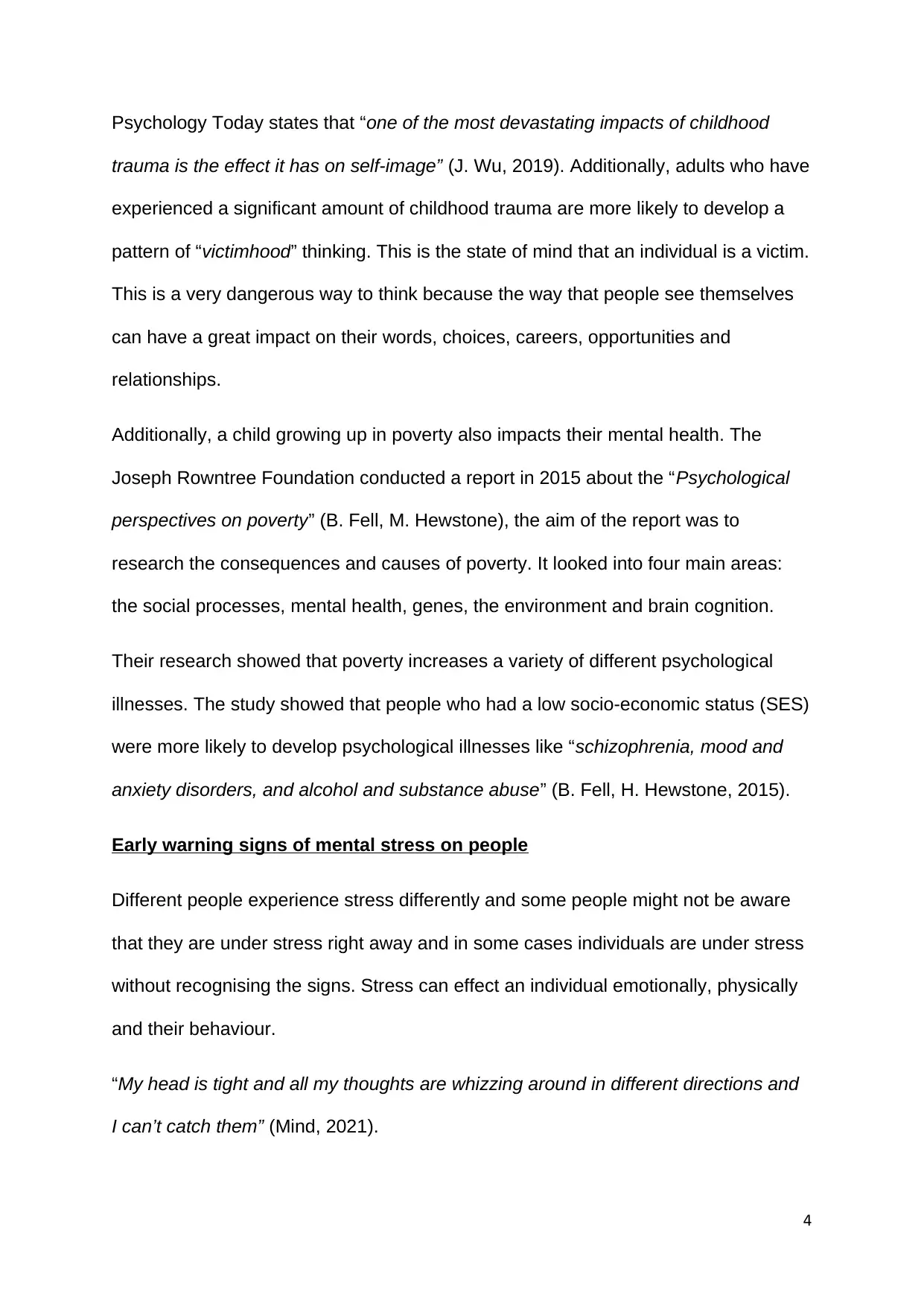
Psychology Today states that “one of the most devastating impacts of childhood
trauma is the effect it has on self-image” (J. Wu, 2019). Additionally, adults who have
experienced a significant amount of childhood trauma are more likely to develop a
pattern of “victimhood” thinking. This is the state of mind that an individual is a victim.
This is a very dangerous way to think because the way that people see themselves
can have a great impact on their words, choices, careers, opportunities and
relationships.
Additionally, a child growing up in poverty also impacts their mental health. The
Joseph Rowntree Foundation conducted a report in 2015 about the “Psychological
perspectives on poverty” (B. Fell, M. Hewstone), the aim of the report was to
research the consequences and causes of poverty. It looked into four main areas:
the social processes, mental health, genes, the environment and brain cognition.
Their research showed that poverty increases a variety of different psychological
illnesses. The study showed that people who had a low socio-economic status (SES)
were more likely to develop psychological illnesses like “schizophrenia, mood and
anxiety disorders, and alcohol and substance abuse” (B. Fell, H. Hewstone, 2015).
Early warning signs of mental stress on people
Different people experience stress differently and some people might not be aware
that they are under stress right away and in some cases individuals are under stress
without recognising the signs. Stress can effect an individual emotionally, physically
and their behaviour.
“My head is tight and all my thoughts are whizzing around in different directions and
I can’t catch them” (Mind, 2021).
4
trauma is the effect it has on self-image” (J. Wu, 2019). Additionally, adults who have
experienced a significant amount of childhood trauma are more likely to develop a
pattern of “victimhood” thinking. This is the state of mind that an individual is a victim.
This is a very dangerous way to think because the way that people see themselves
can have a great impact on their words, choices, careers, opportunities and
relationships.
Additionally, a child growing up in poverty also impacts their mental health. The
Joseph Rowntree Foundation conducted a report in 2015 about the “Psychological
perspectives on poverty” (B. Fell, M. Hewstone), the aim of the report was to
research the consequences and causes of poverty. It looked into four main areas:
the social processes, mental health, genes, the environment and brain cognition.
Their research showed that poverty increases a variety of different psychological
illnesses. The study showed that people who had a low socio-economic status (SES)
were more likely to develop psychological illnesses like “schizophrenia, mood and
anxiety disorders, and alcohol and substance abuse” (B. Fell, H. Hewstone, 2015).
Early warning signs of mental stress on people
Different people experience stress differently and some people might not be aware
that they are under stress right away and in some cases individuals are under stress
without recognising the signs. Stress can effect an individual emotionally, physically
and their behaviour.
“My head is tight and all my thoughts are whizzing around in different directions and
I can’t catch them” (Mind, 2021).
4
Paraphrase This Document
Need a fresh take? Get an instant paraphrase of this document with our AI Paraphraser
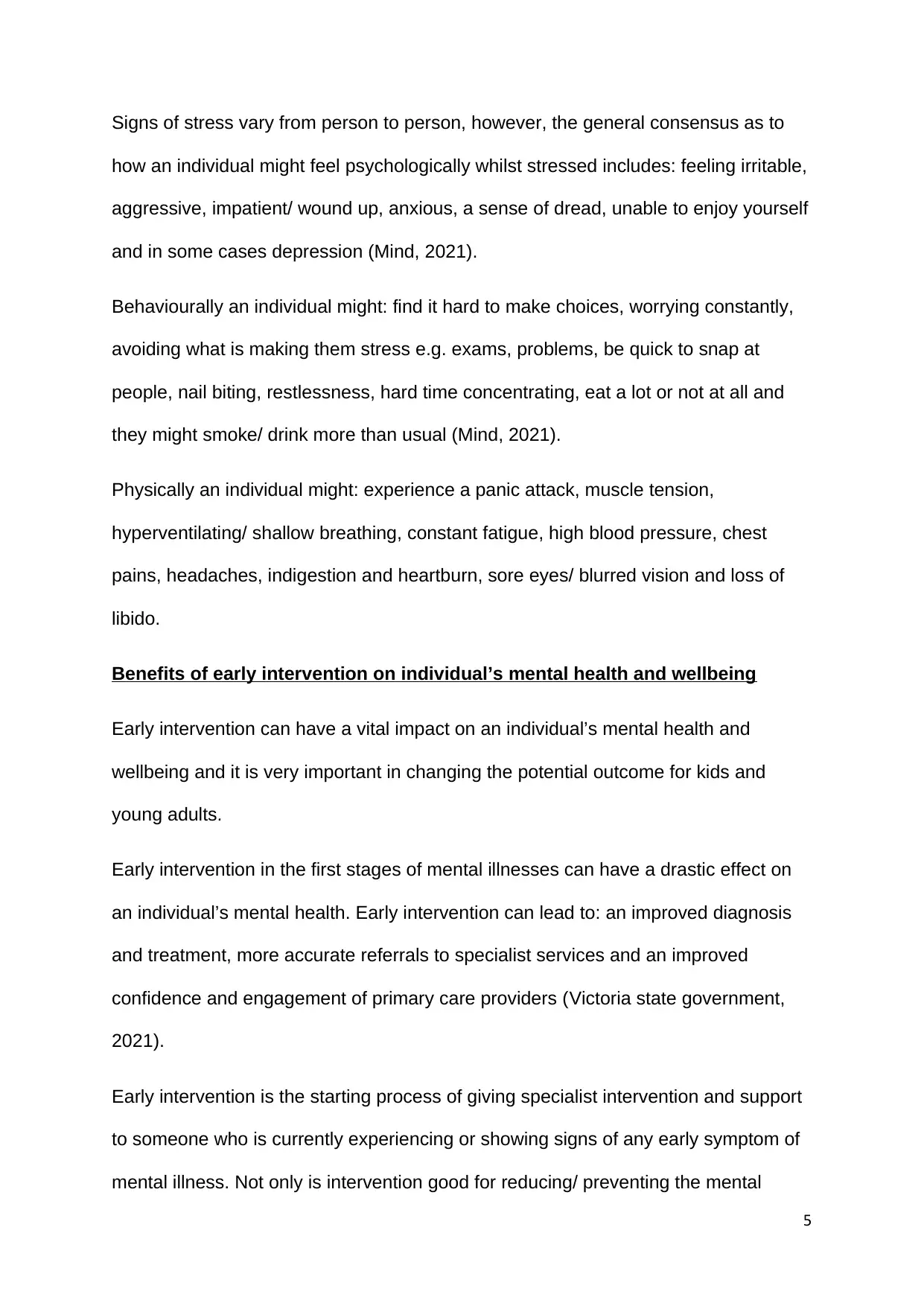
Signs of stress vary from person to person, however, the general consensus as to
how an individual might feel psychologically whilst stressed includes: feeling irritable,
aggressive, impatient/ wound up, anxious, a sense of dread, unable to enjoy yourself
and in some cases depression (Mind, 2021).
Behaviourally an individual might: find it hard to make choices, worrying constantly,
avoiding what is making them stress e.g. exams, problems, be quick to snap at
people, nail biting, restlessness, hard time concentrating, eat a lot or not at all and
they might smoke/ drink more than usual (Mind, 2021).
Physically an individual might: experience a panic attack, muscle tension,
hyperventilating/ shallow breathing, constant fatigue, high blood pressure, chest
pains, headaches, indigestion and heartburn, sore eyes/ blurred vision and loss of
libido.
Benefits of early intervention on individual’s mental health and wellbeing
Early intervention can have a vital impact on an individual’s mental health and
wellbeing and it is very important in changing the potential outcome for kids and
young adults.
Early intervention in the first stages of mental illnesses can have a drastic effect on
an individual’s mental health. Early intervention can lead to: an improved diagnosis
and treatment, more accurate referrals to specialist services and an improved
confidence and engagement of primary care providers (Victoria state government,
2021).
Early intervention is the starting process of giving specialist intervention and support
to someone who is currently experiencing or showing signs of any early symptom of
mental illness. Not only is intervention good for reducing/ preventing the mental
5
how an individual might feel psychologically whilst stressed includes: feeling irritable,
aggressive, impatient/ wound up, anxious, a sense of dread, unable to enjoy yourself
and in some cases depression (Mind, 2021).
Behaviourally an individual might: find it hard to make choices, worrying constantly,
avoiding what is making them stress e.g. exams, problems, be quick to snap at
people, nail biting, restlessness, hard time concentrating, eat a lot or not at all and
they might smoke/ drink more than usual (Mind, 2021).
Physically an individual might: experience a panic attack, muscle tension,
hyperventilating/ shallow breathing, constant fatigue, high blood pressure, chest
pains, headaches, indigestion and heartburn, sore eyes/ blurred vision and loss of
libido.
Benefits of early intervention on individual’s mental health and wellbeing
Early intervention can have a vital impact on an individual’s mental health and
wellbeing and it is very important in changing the potential outcome for kids and
young adults.
Early intervention in the first stages of mental illnesses can have a drastic effect on
an individual’s mental health. Early intervention can lead to: an improved diagnosis
and treatment, more accurate referrals to specialist services and an improved
confidence and engagement of primary care providers (Victoria state government,
2021).
Early intervention is the starting process of giving specialist intervention and support
to someone who is currently experiencing or showing signs of any early symptom of
mental illness. Not only is intervention good for reducing/ preventing the mental
5
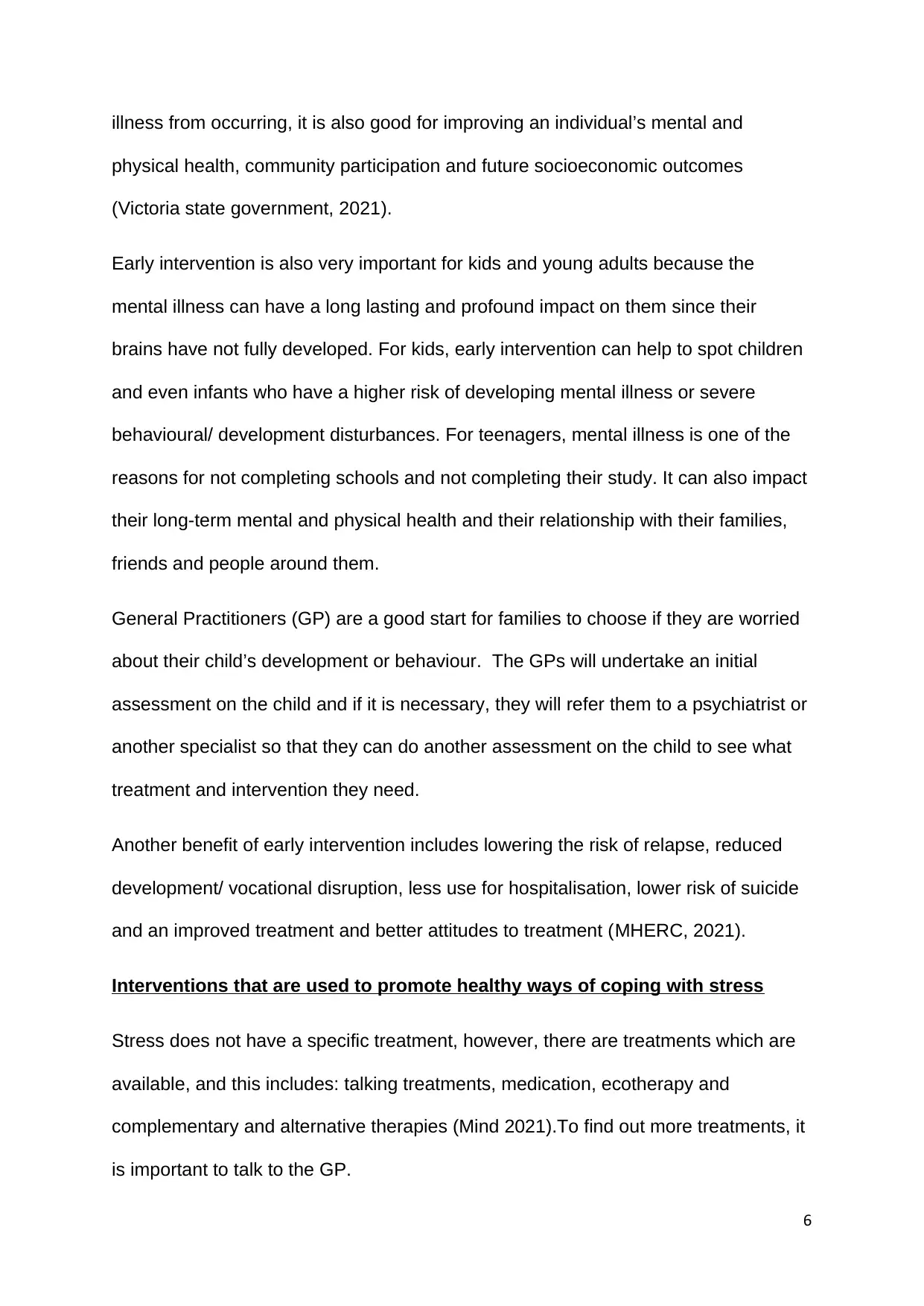
illness from occurring, it is also good for improving an individual’s mental and
physical health, community participation and future socioeconomic outcomes
(Victoria state government, 2021).
Early intervention is also very important for kids and young adults because the
mental illness can have a long lasting and profound impact on them since their
brains have not fully developed. For kids, early intervention can help to spot children
and even infants who have a higher risk of developing mental illness or severe
behavioural/ development disturbances. For teenagers, mental illness is one of the
reasons for not completing schools and not completing their study. It can also impact
their long-term mental and physical health and their relationship with their families,
friends and people around them.
General Practitioners (GP) are a good start for families to choose if they are worried
about their child’s development or behaviour. The GPs will undertake an initial
assessment on the child and if it is necessary, they will refer them to a psychiatrist or
another specialist so that they can do another assessment on the child to see what
treatment and intervention they need.
Another benefit of early intervention includes lowering the risk of relapse, reduced
development/ vocational disruption, less use for hospitalisation, lower risk of suicide
and an improved treatment and better attitudes to treatment (MHERC, 2021).
Interventions that are used to promote healthy ways of coping with stress
Stress does not have a specific treatment, however, there are treatments which are
available, and this includes: talking treatments, medication, ecotherapy and
complementary and alternative therapies (Mind 2021).To find out more treatments, it
is important to talk to the GP.
6
physical health, community participation and future socioeconomic outcomes
(Victoria state government, 2021).
Early intervention is also very important for kids and young adults because the
mental illness can have a long lasting and profound impact on them since their
brains have not fully developed. For kids, early intervention can help to spot children
and even infants who have a higher risk of developing mental illness or severe
behavioural/ development disturbances. For teenagers, mental illness is one of the
reasons for not completing schools and not completing their study. It can also impact
their long-term mental and physical health and their relationship with their families,
friends and people around them.
General Practitioners (GP) are a good start for families to choose if they are worried
about their child’s development or behaviour. The GPs will undertake an initial
assessment on the child and if it is necessary, they will refer them to a psychiatrist or
another specialist so that they can do another assessment on the child to see what
treatment and intervention they need.
Another benefit of early intervention includes lowering the risk of relapse, reduced
development/ vocational disruption, less use for hospitalisation, lower risk of suicide
and an improved treatment and better attitudes to treatment (MHERC, 2021).
Interventions that are used to promote healthy ways of coping with stress
Stress does not have a specific treatment, however, there are treatments which are
available, and this includes: talking treatments, medication, ecotherapy and
complementary and alternative therapies (Mind 2021).To find out more treatments, it
is important to talk to the GP.
6
⊘ This is a preview!⊘
Do you want full access?
Subscribe today to unlock all pages.

Trusted by 1+ million students worldwide
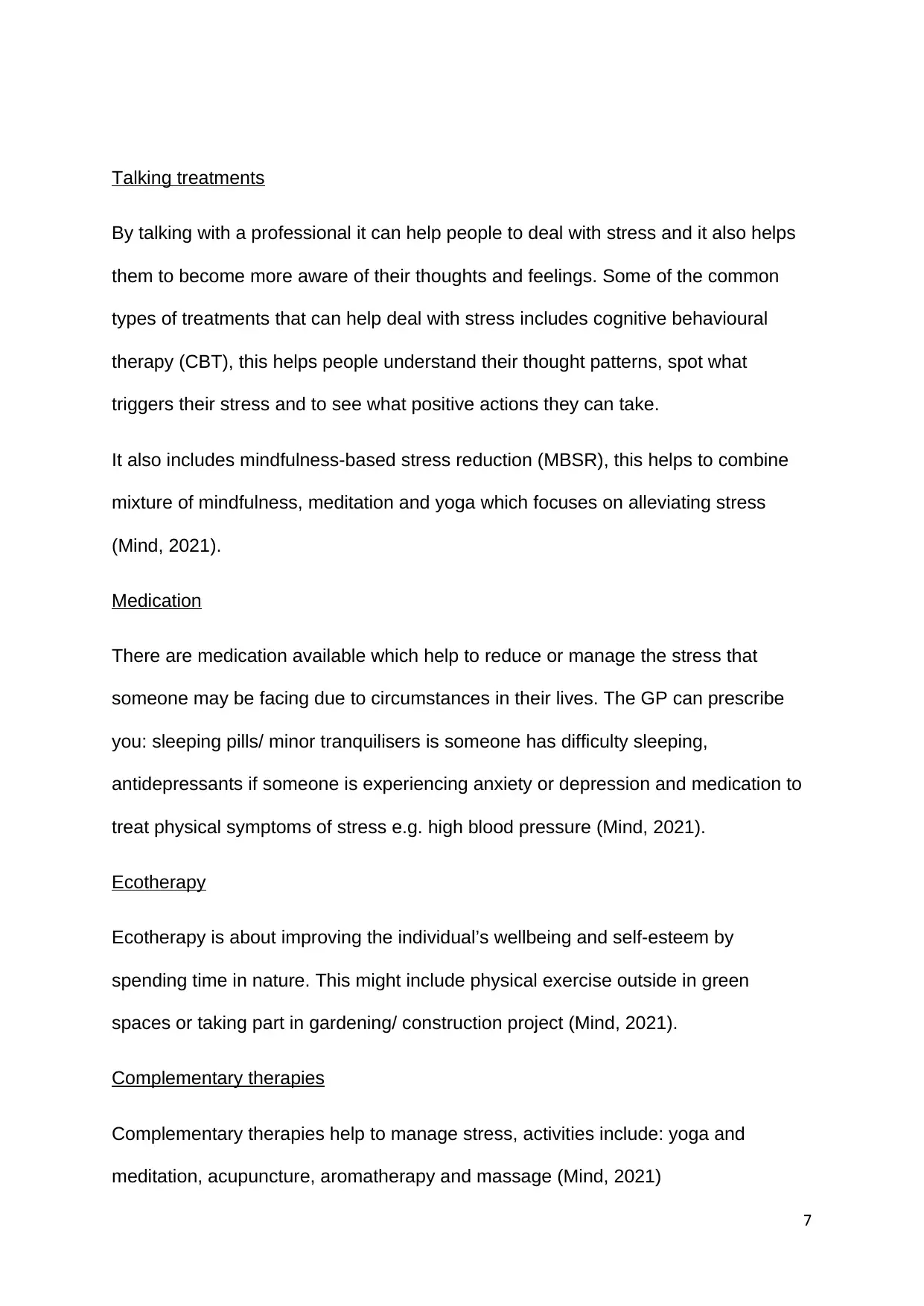
Talking treatments
By talking with a professional it can help people to deal with stress and it also helps
them to become more aware of their thoughts and feelings. Some of the common
types of treatments that can help deal with stress includes cognitive behavioural
therapy (CBT), this helps people understand their thought patterns, spot what
triggers their stress and to see what positive actions they can take.
It also includes mindfulness-based stress reduction (MBSR), this helps to combine
mixture of mindfulness, meditation and yoga which focuses on alleviating stress
(Mind, 2021).
Medication
There are medication available which help to reduce or manage the stress that
someone may be facing due to circumstances in their lives. The GP can prescribe
you: sleeping pills/ minor tranquilisers is someone has difficulty sleeping,
antidepressants if someone is experiencing anxiety or depression and medication to
treat physical symptoms of stress e.g. high blood pressure (Mind, 2021).
Ecotherapy
Ecotherapy is about improving the individual’s wellbeing and self-esteem by
spending time in nature. This might include physical exercise outside in green
spaces or taking part in gardening/ construction project (Mind, 2021).
Complementary therapies
Complementary therapies help to manage stress, activities include: yoga and
meditation, acupuncture, aromatherapy and massage (Mind, 2021)
7
By talking with a professional it can help people to deal with stress and it also helps
them to become more aware of their thoughts and feelings. Some of the common
types of treatments that can help deal with stress includes cognitive behavioural
therapy (CBT), this helps people understand their thought patterns, spot what
triggers their stress and to see what positive actions they can take.
It also includes mindfulness-based stress reduction (MBSR), this helps to combine
mixture of mindfulness, meditation and yoga which focuses on alleviating stress
(Mind, 2021).
Medication
There are medication available which help to reduce or manage the stress that
someone may be facing due to circumstances in their lives. The GP can prescribe
you: sleeping pills/ minor tranquilisers is someone has difficulty sleeping,
antidepressants if someone is experiencing anxiety or depression and medication to
treat physical symptoms of stress e.g. high blood pressure (Mind, 2021).
Ecotherapy
Ecotherapy is about improving the individual’s wellbeing and self-esteem by
spending time in nature. This might include physical exercise outside in green
spaces or taking part in gardening/ construction project (Mind, 2021).
Complementary therapies
Complementary therapies help to manage stress, activities include: yoga and
meditation, acupuncture, aromatherapy and massage (Mind, 2021)
7
Paraphrase This Document
Need a fresh take? Get an instant paraphrase of this document with our AI Paraphraser
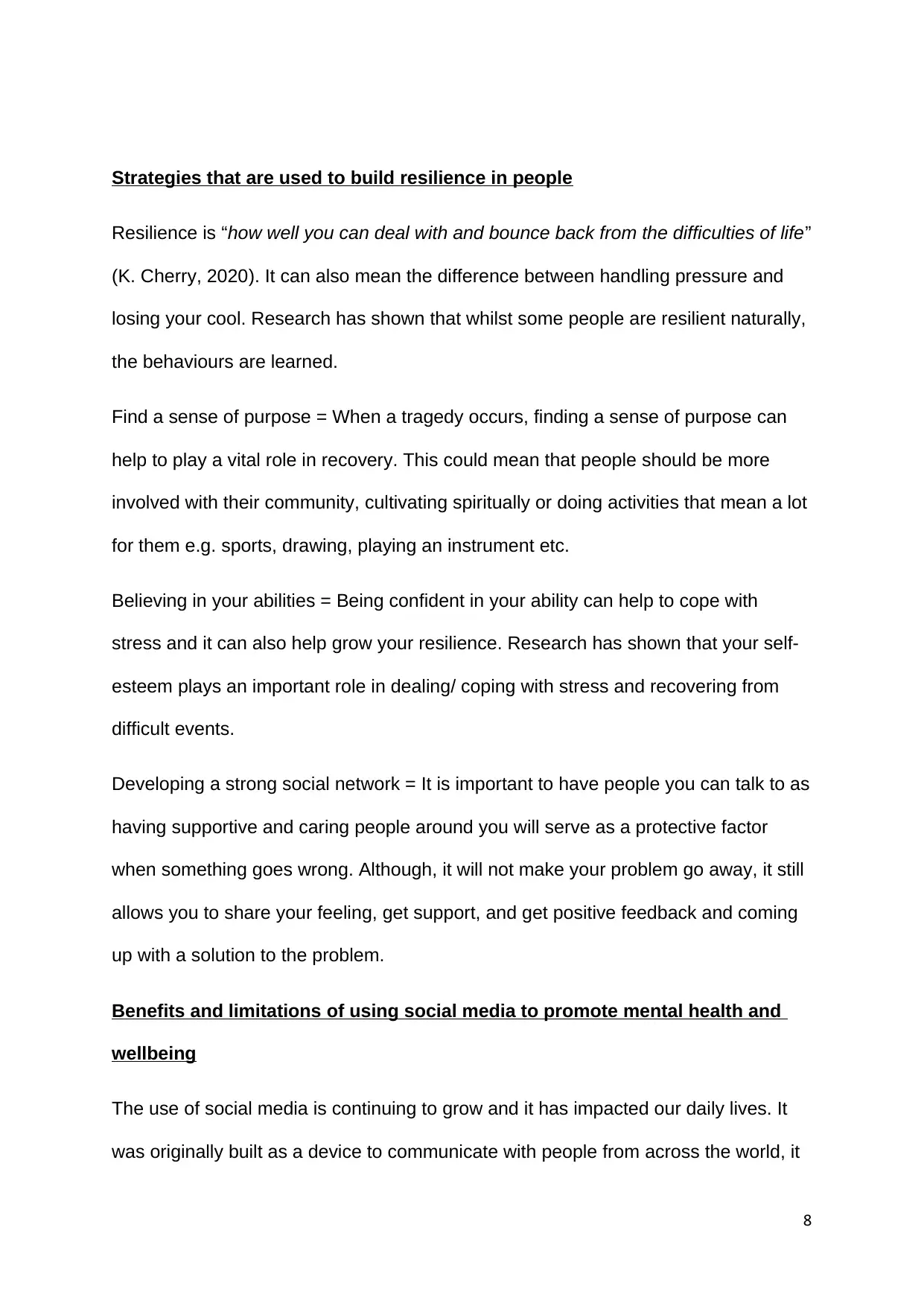
Strategies that are used to build resilience in people
Resilience is “how well you can deal with and bounce back from the difficulties of life”
(K. Cherry, 2020). It can also mean the difference between handling pressure and
losing your cool. Research has shown that whilst some people are resilient naturally,
the behaviours are learned.
Find a sense of purpose = When a tragedy occurs, finding a sense of purpose can
help to play a vital role in recovery. This could mean that people should be more
involved with their community, cultivating spiritually or doing activities that mean a lot
for them e.g. sports, drawing, playing an instrument etc.
Believing in your abilities = Being confident in your ability can help to cope with
stress and it can also help grow your resilience. Research has shown that your self-
esteem plays an important role in dealing/ coping with stress and recovering from
difficult events.
Developing a strong social network = It is important to have people you can talk to as
having supportive and caring people around you will serve as a protective factor
when something goes wrong. Although, it will not make your problem go away, it still
allows you to share your feeling, get support, and get positive feedback and coming
up with a solution to the problem.
Benefits and limitations of using social media to promote mental health and
wellbeing
The use of social media is continuing to grow and it has impacted our daily lives. It
was originally built as a device to communicate with people from across the world, it
8
Resilience is “how well you can deal with and bounce back from the difficulties of life”
(K. Cherry, 2020). It can also mean the difference between handling pressure and
losing your cool. Research has shown that whilst some people are resilient naturally,
the behaviours are learned.
Find a sense of purpose = When a tragedy occurs, finding a sense of purpose can
help to play a vital role in recovery. This could mean that people should be more
involved with their community, cultivating spiritually or doing activities that mean a lot
for them e.g. sports, drawing, playing an instrument etc.
Believing in your abilities = Being confident in your ability can help to cope with
stress and it can also help grow your resilience. Research has shown that your self-
esteem plays an important role in dealing/ coping with stress and recovering from
difficult events.
Developing a strong social network = It is important to have people you can talk to as
having supportive and caring people around you will serve as a protective factor
when something goes wrong. Although, it will not make your problem go away, it still
allows you to share your feeling, get support, and get positive feedback and coming
up with a solution to the problem.
Benefits and limitations of using social media to promote mental health and
wellbeing
The use of social media is continuing to grow and it has impacted our daily lives. It
was originally built as a device to communicate with people from across the world, it
8
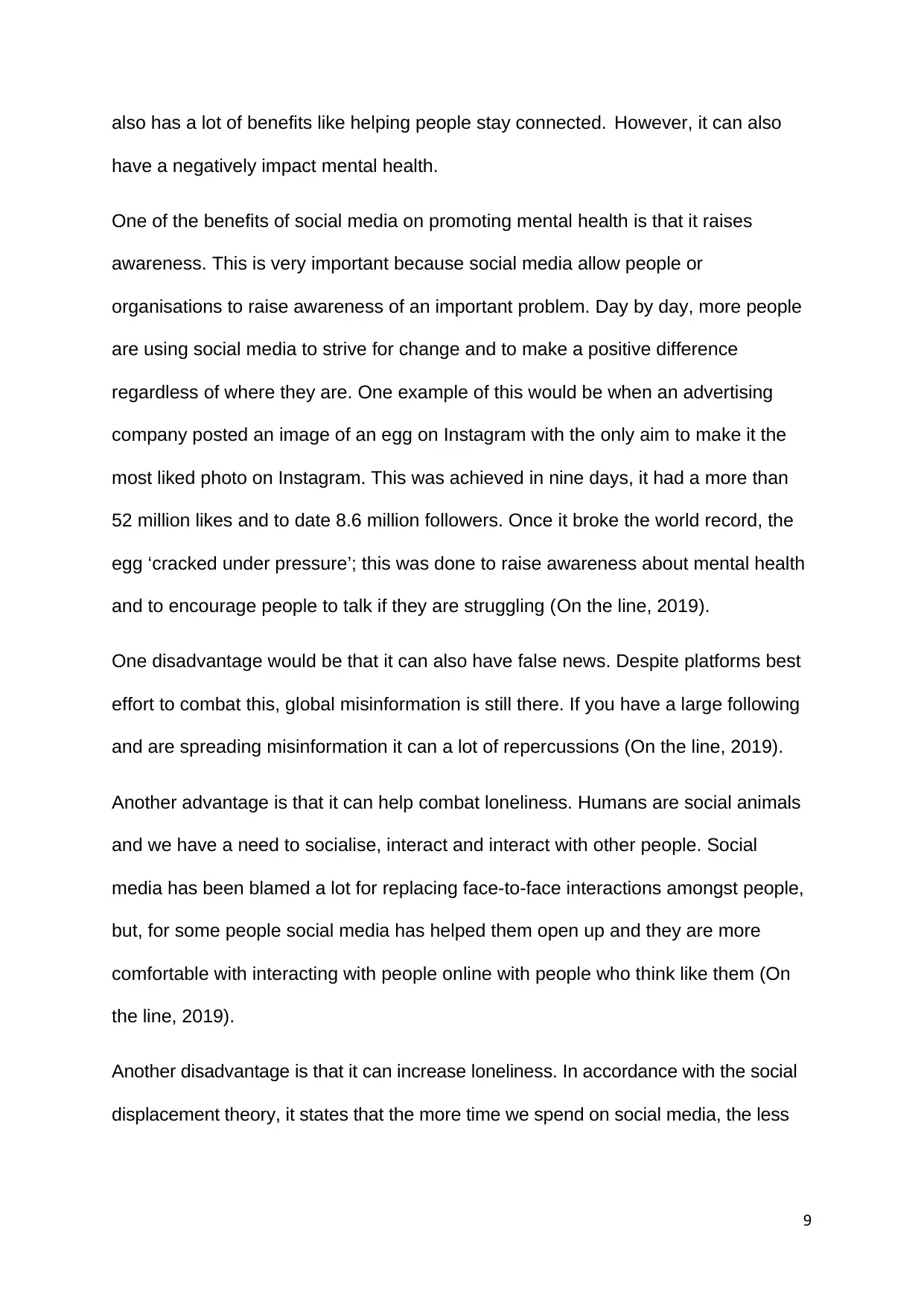
also has a lot of benefits like helping people stay connected. However, it can also
have a negatively impact mental health.
One of the benefits of social media on promoting mental health is that it raises
awareness. This is very important because social media allow people or
organisations to raise awareness of an important problem. Day by day, more people
are using social media to strive for change and to make a positive difference
regardless of where they are. One example of this would be when an advertising
company posted an image of an egg on Instagram with the only aim to make it the
most liked photo on Instagram. This was achieved in nine days, it had a more than
52 million likes and to date 8.6 million followers. Once it broke the world record, the
egg ‘cracked under pressure’; this was done to raise awareness about mental health
and to encourage people to talk if they are struggling (On the line, 2019).
One disadvantage would be that it can also have false news. Despite platforms best
effort to combat this, global misinformation is still there. If you have a large following
and are spreading misinformation it can a lot of repercussions (On the line, 2019).
Another advantage is that it can help combat loneliness. Humans are social animals
and we have a need to socialise, interact and interact with other people. Social
media has been blamed a lot for replacing face-to-face interactions amongst people,
but, for some people social media has helped them open up and they are more
comfortable with interacting with people online with people who think like them (On
the line, 2019).
Another disadvantage is that it can increase loneliness. In accordance with the social
displacement theory, it states that the more time we spend on social media, the less
9
have a negatively impact mental health.
One of the benefits of social media on promoting mental health is that it raises
awareness. This is very important because social media allow people or
organisations to raise awareness of an important problem. Day by day, more people
are using social media to strive for change and to make a positive difference
regardless of where they are. One example of this would be when an advertising
company posted an image of an egg on Instagram with the only aim to make it the
most liked photo on Instagram. This was achieved in nine days, it had a more than
52 million likes and to date 8.6 million followers. Once it broke the world record, the
egg ‘cracked under pressure’; this was done to raise awareness about mental health
and to encourage people to talk if they are struggling (On the line, 2019).
One disadvantage would be that it can also have false news. Despite platforms best
effort to combat this, global misinformation is still there. If you have a large following
and are spreading misinformation it can a lot of repercussions (On the line, 2019).
Another advantage is that it can help combat loneliness. Humans are social animals
and we have a need to socialise, interact and interact with other people. Social
media has been blamed a lot for replacing face-to-face interactions amongst people,
but, for some people social media has helped them open up and they are more
comfortable with interacting with people online with people who think like them (On
the line, 2019).
Another disadvantage is that it can increase loneliness. In accordance with the social
displacement theory, it states that the more time we spend on social media, the less
9
⊘ This is a preview!⊘
Do you want full access?
Subscribe today to unlock all pages.

Trusted by 1+ million students worldwide
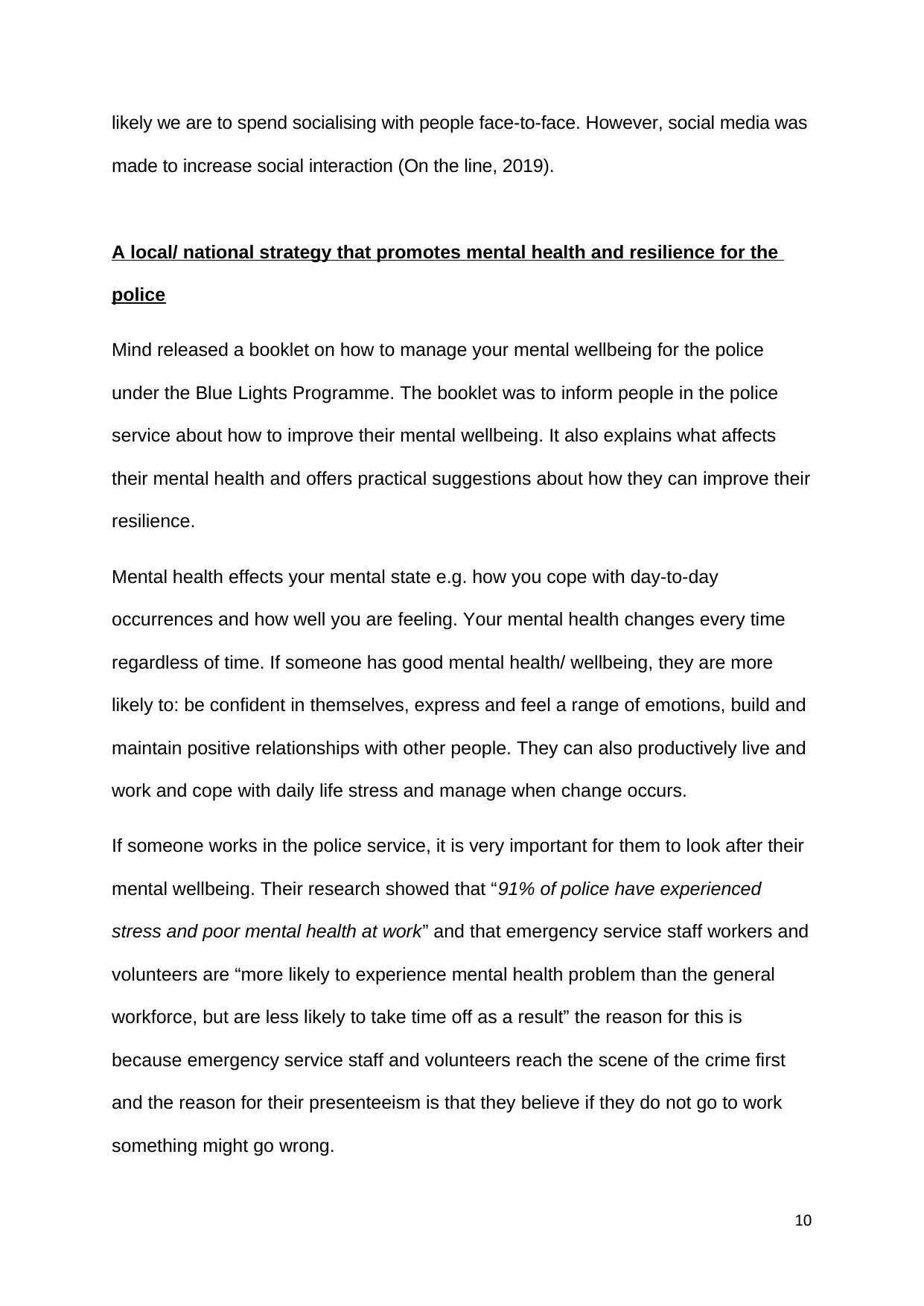
likely we are to spend socialising with people face-to-face. However, social media was
made to increase social interaction (On the line, 2019).
A local/ national strategy that promotes mental health and resilience for the
police
Mind released a booklet on how to manage your mental wellbeing for the police
under the Blue Lights Programme. The booklet was to inform people in the police
service about how to improve their mental wellbeing. It also explains what affects
their mental health and offers practical suggestions about how they can improve their
resilience.
Mental health effects your mental state e.g. how you cope with day-to-day
occurrences and how well you are feeling. Your mental health changes every time
regardless of time. If someone has good mental health/ wellbeing, they are more
likely to: be confident in themselves, express and feel a range of emotions, build and
maintain positive relationships with other people. They can also productively live and
work and cope with daily life stress and manage when change occurs.
If someone works in the police service, it is very important for them to look after their
mental wellbeing. Their research showed that “91% of police have experienced
stress and poor mental health at work” and that emergency service staff workers and
volunteers are “more likely to experience mental health problem than the general
workforce, but are less likely to take time off as a result” the reason for this is
because emergency service staff and volunteers reach the scene of the crime first
and the reason for their presenteeism is that they believe if they do not go to work
something might go wrong.
10
made to increase social interaction (On the line, 2019).
A local/ national strategy that promotes mental health and resilience for the
police
Mind released a booklet on how to manage your mental wellbeing for the police
under the Blue Lights Programme. The booklet was to inform people in the police
service about how to improve their mental wellbeing. It also explains what affects
their mental health and offers practical suggestions about how they can improve their
resilience.
Mental health effects your mental state e.g. how you cope with day-to-day
occurrences and how well you are feeling. Your mental health changes every time
regardless of time. If someone has good mental health/ wellbeing, they are more
likely to: be confident in themselves, express and feel a range of emotions, build and
maintain positive relationships with other people. They can also productively live and
work and cope with daily life stress and manage when change occurs.
If someone works in the police service, it is very important for them to look after their
mental wellbeing. Their research showed that “91% of police have experienced
stress and poor mental health at work” and that emergency service staff workers and
volunteers are “more likely to experience mental health problem than the general
workforce, but are less likely to take time off as a result” the reason for this is
because emergency service staff and volunteers reach the scene of the crime first
and the reason for their presenteeism is that they believe if they do not go to work
something might go wrong.
10
Paraphrase This Document
Need a fresh take? Get an instant paraphrase of this document with our AI Paraphraser
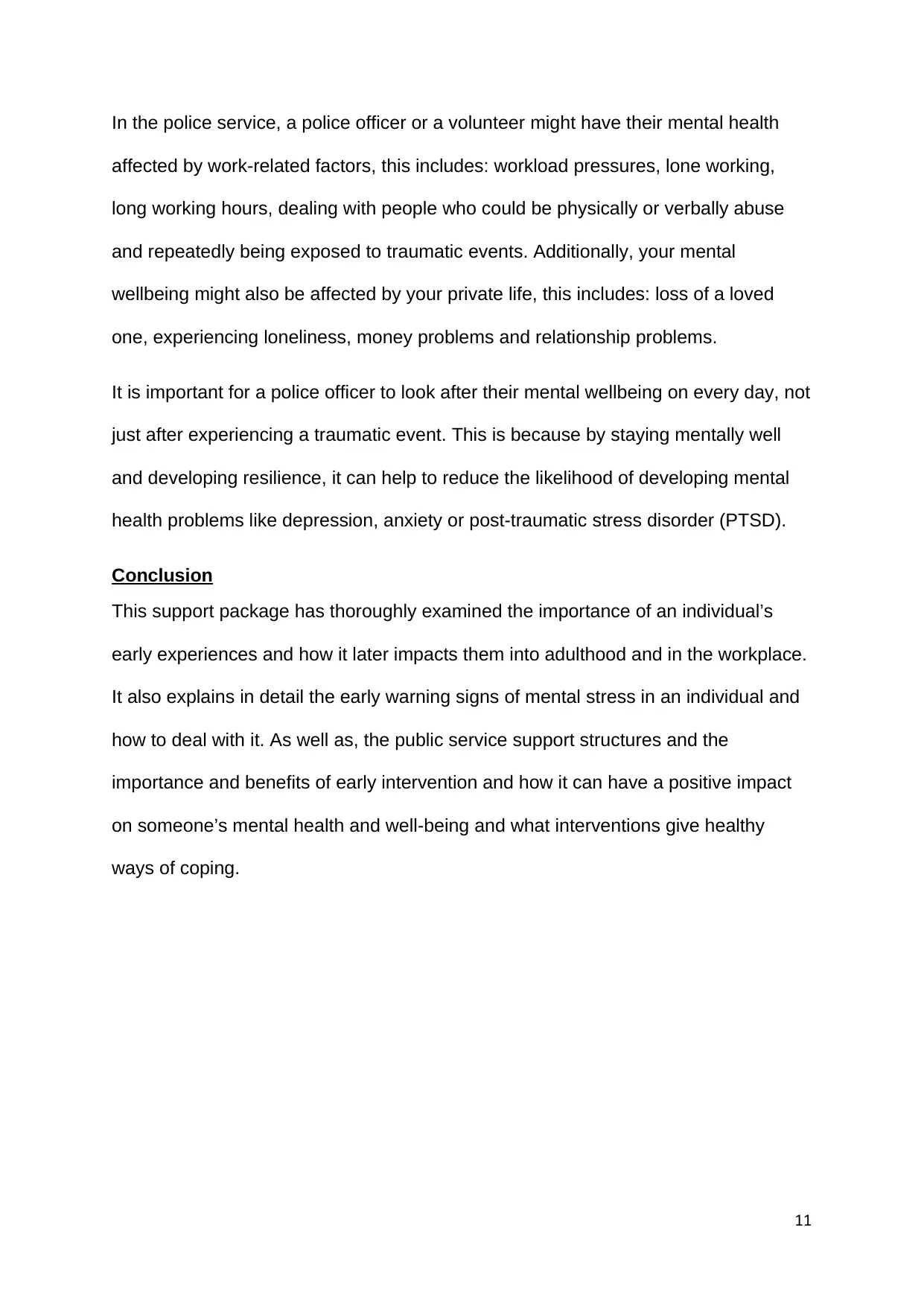
In the police service, a police officer or a volunteer might have their mental health
affected by work-related factors, this includes: workload pressures, lone working,
long working hours, dealing with people who could be physically or verbally abuse
and repeatedly being exposed to traumatic events. Additionally, your mental
wellbeing might also be affected by your private life, this includes: loss of a loved
one, experiencing loneliness, money problems and relationship problems.
It is important for a police officer to look after their mental wellbeing on every day, not
just after experiencing a traumatic event. This is because by staying mentally well
and developing resilience, it can help to reduce the likelihood of developing mental
health problems like depression, anxiety or post-traumatic stress disorder (PTSD).
Conclusion
This support package has thoroughly examined the importance of an individual’s
early experiences and how it later impacts them into adulthood and in the workplace.
It also explains in detail the early warning signs of mental stress in an individual and
how to deal with it. As well as, the public service support structures and the
importance and benefits of early intervention and how it can have a positive impact
on someone’s mental health and well-being and what interventions give healthy
ways of coping.
11
affected by work-related factors, this includes: workload pressures, lone working,
long working hours, dealing with people who could be physically or verbally abuse
and repeatedly being exposed to traumatic events. Additionally, your mental
wellbeing might also be affected by your private life, this includes: loss of a loved
one, experiencing loneliness, money problems and relationship problems.
It is important for a police officer to look after their mental wellbeing on every day, not
just after experiencing a traumatic event. This is because by staying mentally well
and developing resilience, it can help to reduce the likelihood of developing mental
health problems like depression, anxiety or post-traumatic stress disorder (PTSD).
Conclusion
This support package has thoroughly examined the importance of an individual’s
early experiences and how it later impacts them into adulthood and in the workplace.
It also explains in detail the early warning signs of mental stress in an individual and
how to deal with it. As well as, the public service support structures and the
importance and benefits of early intervention and how it can have a positive impact
on someone’s mental health and well-being and what interventions give healthy
ways of coping.
11
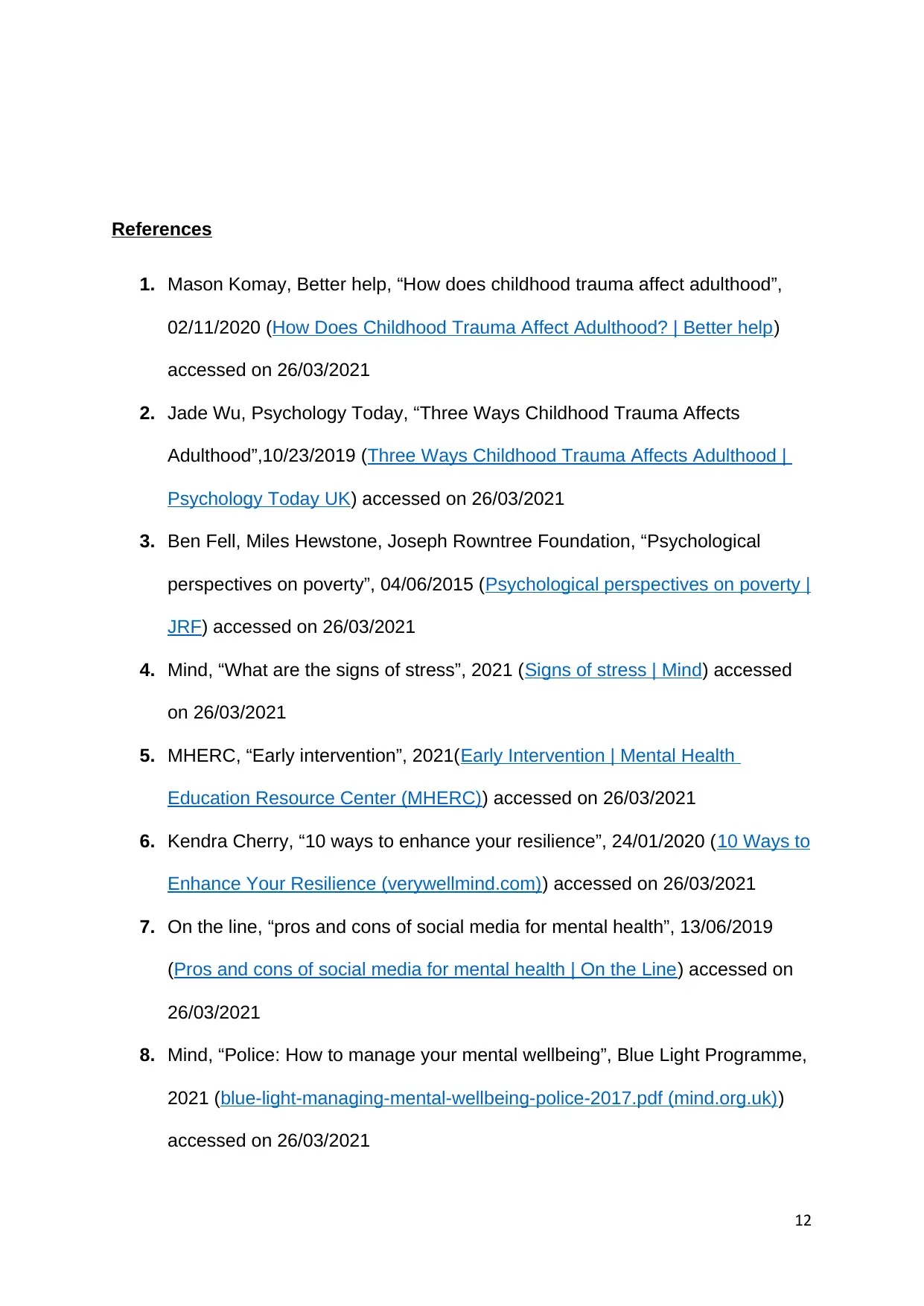
References
1. Mason Komay, Better help, “How does childhood trauma affect adulthood”,
02/11/2020 (How Does Childhood Trauma Affect Adulthood? | Better help)
accessed on 26/03/2021
2. Jade Wu, Psychology Today, “Three Ways Childhood Trauma Affects
Adulthood”,10/23/2019 (Three Ways Childhood Trauma Affects Adulthood |
Psychology Today UK) accessed on 26/03/2021
3. Ben Fell, Miles Hewstone, Joseph Rowntree Foundation, “Psychological
perspectives on poverty”, 04/06/2015 (Psychological perspectives on poverty |
JRF) accessed on 26/03/2021
4. Mind, “What are the signs of stress”, 2021 (Signs of stress | Mind) accessed
on 26/03/2021
5. MHERC, “Early intervention”, 2021(Early Intervention | Mental Health
Education Resource Center (MHERC)) accessed on 26/03/2021
6. Kendra Cherry, “10 ways to enhance your resilience”, 24/01/2020 (10 Ways to
Enhance Your Resilience (verywellmind.com)) accessed on 26/03/2021
7. On the line, “pros and cons of social media for mental health”, 13/06/2019
(Pros and cons of social media for mental health | On the Line) accessed on
26/03/2021
8. Mind, “Police: How to manage your mental wellbeing”, Blue Light Programme,
2021 (blue-light-managing-mental-wellbeing-police-2017.pdf (mind.org.uk))
accessed on 26/03/2021
12
1. Mason Komay, Better help, “How does childhood trauma affect adulthood”,
02/11/2020 (How Does Childhood Trauma Affect Adulthood? | Better help)
accessed on 26/03/2021
2. Jade Wu, Psychology Today, “Three Ways Childhood Trauma Affects
Adulthood”,10/23/2019 (Three Ways Childhood Trauma Affects Adulthood |
Psychology Today UK) accessed on 26/03/2021
3. Ben Fell, Miles Hewstone, Joseph Rowntree Foundation, “Psychological
perspectives on poverty”, 04/06/2015 (Psychological perspectives on poverty |
JRF) accessed on 26/03/2021
4. Mind, “What are the signs of stress”, 2021 (Signs of stress | Mind) accessed
on 26/03/2021
5. MHERC, “Early intervention”, 2021(Early Intervention | Mental Health
Education Resource Center (MHERC)) accessed on 26/03/2021
6. Kendra Cherry, “10 ways to enhance your resilience”, 24/01/2020 (10 Ways to
Enhance Your Resilience (verywellmind.com)) accessed on 26/03/2021
7. On the line, “pros and cons of social media for mental health”, 13/06/2019
(Pros and cons of social media for mental health | On the Line) accessed on
26/03/2021
8. Mind, “Police: How to manage your mental wellbeing”, Blue Light Programme,
2021 (blue-light-managing-mental-wellbeing-police-2017.pdf (mind.org.uk))
accessed on 26/03/2021
12
⊘ This is a preview!⊘
Do you want full access?
Subscribe today to unlock all pages.

Trusted by 1+ million students worldwide
1 out of 12
Related Documents
Your All-in-One AI-Powered Toolkit for Academic Success.
+13062052269
info@desklib.com
Available 24*7 on WhatsApp / Email
![[object Object]](/_next/static/media/star-bottom.7253800d.svg)
Unlock your academic potential
Copyright © 2020–2026 A2Z Services. All Rights Reserved. Developed and managed by ZUCOL.





